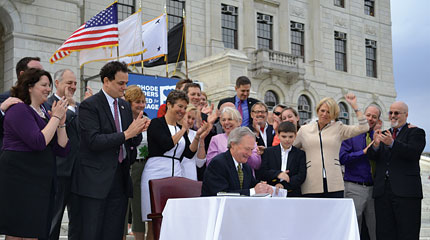 By: Casey Rocheteau/TRT Reporter–
By: Casey Rocheteau/TRT Reporter–
The fight for marriage equality in Rhode Island got a thrust in the right direction May 14, when Governor Lincoln Chafee issued an executive order mandating that the state would recognize out-of-state same-sex marriages.
The order dictated that “all executive state departments, agencies, and offices shall recognize the lawful marriages of same-sex couples as valid for any purpose arising within the execution of its duties.” The executive order is the first of its kind in any state.
While a few other states have passed similar legislation, they have done it through other bureaucratic routes. The action taken by Chafee may serve as an example to other states. The news came around the same time an amendment passed in North Carolina eradicating rights for many non-married couples. While the order was announced a few weeks earlier than anticipated, it had been planned for many months, with groups such as Gay and Lesbian Advocates and Defenders (GLAD) and Marriage Equality Rhode Island (MERI) pushing the administration to take this stance on equal rights. Given the recent prominence of civil rights in the news, with the president declaring his support for same-sex marriage, Chafee made a point to stand in solidarity with the president. Senior state senator Jack Reed acted similarly with pressure from activists and issued a statement in favor of marriage equality within hours of Obama doing the same.
Lt. Governor Elizabeth Roberts issued a favorable statement after Chafee’s announcement, writing, “I support full marriage equality for lesbian and gay Rhode Islanders. I applaud the governor’s decision to affirm the legal recognition of marriages entered into in other states. It is an issue of basic fairness and equality.”
The Rainbow Times spoke with Ray Sullivan of MERI to get a better understanding of how the order will translate into people’s lives.
“There’s a number of things that it covers immediately.” he explained. “It applies specifically to R.I. state departments and agencies. MERI and GLAD lobbied the governor to do this to provide much-needed clarity and direction to these agencies who were having issues interpreting the reciprocity statuses that had been on the books since 1904.”
Sullivan explained that the various state agencies “were left to their own devices and were interpreting this poorly and differently. There were situations where other couples were married, and both parents couldn’t be listed on birth certificates, and death certificates also didn’t recognize that people had been married, and people couldn’t transfer the title of their car. Our organization has been working on this for months. It particularly covers things like this, so the health department will list both parents on the birth certificate. This has caused heartache and harm to people who are widowed, especially, to be tied up in all this bureaucratic red tape.”
The Rainbow Times also asked Sullivan about the possibility of passing an executive order that would ordain marriage equality, as there is a common misconception that those with executive power might be able to grant civil rights with one scribble of a pen. He explained that executive orders have the “full weight and legitimacy of the law,” but there are lots of limitations on what can be done. “This order, for instance, still doesn’t cover divorces for same-sex couples,” Sullivan said. “To get divorced you have to move back to the state where you were married, establish residency and then petition those states. And a lot of people don’t have that option. That’s something only the general assembly can grant.”
When asked about the recent decision made in North Carolina, Sullivan pointed out the more local struggle that happened in New Hampshire along similar lines. “New Hampshire passed marriage equality last year, but then Republicans took over the state government, and immediately launched an initiative to repeal marriage equality. However, in New Hampshire, when they called the vote, it was resoundingly defeated. The N.H. Republicans are very serious about being Republicans, but they’re also serious about personal freedoms and rights, so many of them voted against the repeal.”
The question for many LGBTQ Rhode Islanders is what this means for the fight for full marriage equality. Sullivan explained that “[Gov.] Patterson did this in New York, and it’s generally seen as the precursor to marriage equality. In Maryland, I think they did it through the attorney general’s office and the governor stood by it. In 2007, when the Rhode Island attorney general did this, it didn’t matter because of who the governor was.”
For more information about marriage equality in RI or to find answers to other same-sex marriage related questions in RI, visit www.marriageequalityri.org/.





